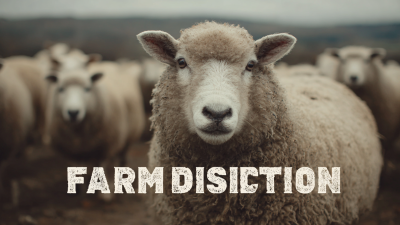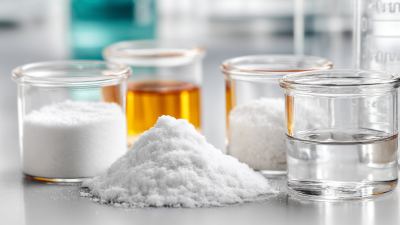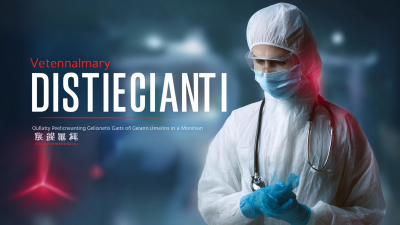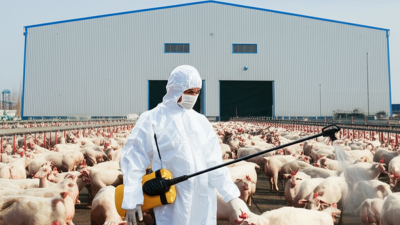In the realm of animal health management, the importance of implementing effective sanitation protocols cannot be overstated. According to the World Organisation for Animal Health (OIE), biosecurity measures—including the use of Vet Disinfectants—can significantly reduce the incidence of infectious diseases in animal populations. A study published in the Journal of Veterinary Science highlighted that proper disinfection practices can lower pathogen loads by up to 99%, thereby protecting both animal and human health. As veterinary practices face growing challenges with zoonotic diseases and antibiotic resistance, leveraging the right Vet Disinfectants becomes crucial. These specialized solutions not only help maintain clean and safe environments for animals but also support the overall efficacy of health interventions, illustrating their essential role in comprehensive animal health management strategies.

Veterinary disinfectants play a crucial role in maintaining animal health management. They are essential tools in preventing the spread of infectious diseases within veterinary practices and farms. Disinfectants eliminate pathogens that can cause severe health issues in animals, thus ensuring a safer environment for both livestock and pets. Understanding the importance of these chemicals can empower veterinary professionals and animal owners to implement better sanitation protocols.
When selecting disinfectants, it's crucial to consider their efficacy against a broad spectrum of pathogens, including bacteria, viruses, and fungi. Always check product labels for specific claims of disease prevention and effectiveness. For instance, using disinfectants that are proven to eradicate Parvovirus can be vital in a kennel setting. Additionally, employing a two-step cleaning process—first removing visible debris and then applying disinfectants—can significantly enhance overall hygiene.
To maximize the effectiveness of disinfectants, it's important to follow the manufacturer's instructions on dilution ratios and contact time. Regular training for staff on proper cleaning techniques and the importance of disinfectant use can further bolster animal health management. Integrating these practices into daily routines ensures that veterinary facilities remain healthy environments conducive to effective animal care.
Regular disinfection practices are crucial in veterinary clinics, significantly enhancing animal health management. According to the Centers for Disease Control and Prevention (CDC), over 75% of emerging infectious diseases in humans are zoonotic, emphasizing the need for rigorous sanitation efforts in veterinary settings. Effective disinfectants can reduce the risk of disease transmission among animals, mitigate outbreaks, and ultimately protect both animal and human health.
Furthermore, a study published in the Journal of Veterinary Intern Medicine highlights that maintaining a clean environment is instrumental in improving recovery rates in post-operative patients. Regularly disinfected surfaces decrease the likelihood of hospital-acquired infections, which can have severe consequences for susceptible animals. In fact, the American Animal Hospital Association (AAHA) recommends specific disinfection protocols for different types of surfaces and equipment to ensure optimal sanitation. By committing to a routine disinfection schedule, veterinary clinics can foster healthier environments for their patients, leading to better overall outcomes in animal health.
| Reason | Description | Benefit |
|---|---|---|
| 1. Disease Prevention | Regular disinfection helps reduce the spread of infectious diseases among animals. | Enhances overall animal health and reduces veterinary costs. |
| 2. Cross-Contamination Control | Disinfectants minimize the risk of transferring pathogens between patients. | Improves safety and efficacy of veterinary procedures. |
| 3. Compliance with Regulations | Maintaining a high level of cleanliness ensures adherence to local health regulations. | Avoids fines and improves clinic reputation. |
| 4. Elimination of Odors | Disinfectants help in neutralizing unpleasant smells from animals. | Creates a more pleasant environment for staff and clients. |
| 5. Effective Pest Control | Certain disinfectants repel pests that may carry diseases. | Protects animals from additional health risks. |
| 6. Improved Recovery Times | Clean environments contribute to faster healing and recovery for sick animals. | Enhances patient turnover and clinic efficiency. |
| 7. Protection for Staff | Reduces the risk of zoonotic diseases among veterinary staff. | Promotes a safer working environment. |
| 8. Enhanced Public Trust | Demonstrating cleanliness and hygiene builds trust with pet owners. | Encourages repeat business and referrals. |
| 9. Cost-Effectiveness | Investing in disinfectants can prevent costly outbreaks. | Saves money in the long term by reducing treatment expenses. |
| 10. Comprehensive Infection Control | Integrating disinfection into regular procedures supports overall infection control. | Creates a holistic approach to veterinary care. |
Disinfectants play a crucial role in maintaining animal health by effectively combating pathogens that can lead to disease outbreaks. In veterinary settings, the wide range of microorganisms such as bacteria, viruses, and fungi can thrive in environments where animals are housed. Using appropriate disinfectants reduces the microbial load on surfaces, minimizing the risk of infection transmission. Regularly disinfecting kennels, examination rooms, and equipment creates a safer environment for both animals and veterinary staff, substantially lowering the chances of disease spread.
Moreover, disinfectants contribute to the overall health management strategy by breaking the cycle of pathogen proliferation. For instance, areas where animals congregate can become hotspots for disease transmission if not properly maintained. By implementing a rigorous disinfection protocol, veterinary practices can protect vulnerable populations, such as young or immunocompromised animals, from potential threats. Through consistent and effective disinfection practices, the veterinary industry can enhance disease control measures, ensuring healthier outcomes for all animals in their care.

Choosing the right disinfectants in veterinary settings is crucial for maintaining animal health and preventing disease outbreaks. The first guideline is to ensure that the disinfectants are broad-spectrum, effective against a variety of pathogens, including bacteria, viruses, and fungi. It's essential to read product labels carefully to confirm that they are approved for use in veterinary environments and have proven efficacy against specific diseases relevant to the animals in your care.
Another important consideration is the safety of the disinfectant for both the animals and the staff. Opt for products that are non-toxic and have low irritation potential. Additionally, consider the application method. Some disinfectants require specific dilution rates or contact times to be effective, and adherence to these guidelines is essential for optimal results. Finally, always take into account the environmental impact of the disinfectants you choose. Eco-friendly options that minimize harm to the surroundings can be just as effective without compromising health standards in your practice.
This chart illustrates the importance of various benefits provided by veterinary disinfectants, highlighting why they are essential for animal health management.
Incorporating disinfectants into daily animal care routines is crucial for maintaining optimal health in any veterinary setting. The presence of pathogens in an animal’s environment can lead to outbreaks of disease, compromising both individual and herd health. By routinely using effective disinfectants, veterinarians and animal caregivers can significantly reduce the risk of transmissible infections. This proactive approach not only protects the animals but also instills confidence in pet owners and farm managers regarding the safety and care of their animals.

Establishing a consistent disinfecting schedule enhances overall hygiene practices, complementing other health management strategies. For example, cleaning surfaces, equipment, and communal areas with approved disinfectants before and after animal contact ensures that harmful bacteria and viruses are effectively eliminated. Integrating disinfectants into daily routines encourages a culture of cleanliness, making it easier to spot and address potential health issues before they escalate. Ultimately, prioritizing sanitation through the use of disinfectants significantly contributes to a healthier environment for animals, paving the way for better health outcomes and more efficient animal management practices.






